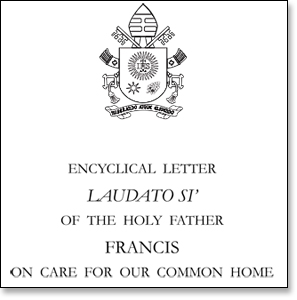|
Deep Ecology and the Implications
of the Pope’s Encyclical A Sermon by Paul Rockwell Fellowship of Unitarian Universalists, Berkeley, California |
||||||
“Who is this guy?” I asked myself when I studied the Pope’s views on profits, on the destructive role of global free markets, on our need to protect the commons from privatization. The Pope writes: “Is it realistic to hope that those who are obsessed with maximizing profits will stop to reflect on the environmental damage, which they will leave behind for future generations? Where profits alone count, there can be no thinking about the rhythms of nature.” Vandana Shiva often reminds us that those who suffer the most from climate change are the least responsible in causing it. Apparently, and perhaps unexpectedly, the spiritual leader of 2.5 billion people agrees with her. The Pope argues that the industrialized West, especially transnational corporations, are causing both climate change and poverty. The Encyclical reflects, not only the influences of Leonardo Boff and liberation theology, it expresses the kind of reverence for nature common to Indigenous peoples ( a reverence for which Saint Francis himself was known. ) For centuries, Christianity treated nature mystics as pagans. Almost 2,000 years ago, established monotheism, especially sin-and-redemption ideology, excluded the natural world as a source of spirituality and inspiration. Winona La Duke, a spokesperson for Indigenous cultures, tells us that, in the continental U.S. genocide and ecocide were part of a single process. The Pope’s Encyclical represents a reform, if not a full ideological change. He writes: "There is a mystical meaning to be found in a leaf, in a mountain trail, in a dewdrop … . We discover the action of God in the soul, but also in all things." Here is the audible link to the full sermon, "Deep Ecology and the Implications of the Pope’s Encyclical,” by Paul Rockwell, delivered at the Berkeley Fellowship of Unitarian Universalists, August 2nd, 2015: http://www.bfuu.org/images/audio/150802.mp3
|
||||||
If you have any thoughts on this or would like to contribute to an ongoing discussion in the  What is New? || Affirmative Action || Art Changes || Autonomy: Chiapas - California || Community Images || Education Rights || E-mail, Opinions and Discussion || En español || Essays from Ireland || Global Eyes || Healthcare || Human Rights/Civil Rights || Piri Thomas || Photo of the Week || QA: Interviews || Region || Rural America || Search || Donate || To be notified of new articles || Survey || In Motion Magazine's Store || In Motion Magazine Staff || In Unity Book of Photos || Links Around The World NPC Productions Copyright © 1995-2020 NPC Productions as a compilation. All Rights Reserved. |


